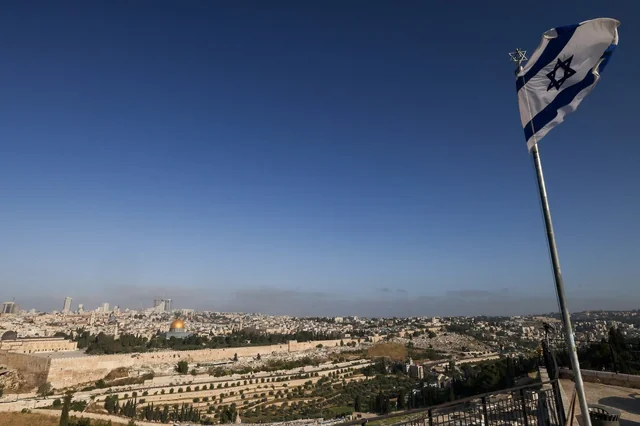April 19, 2024 at 7:10 p.m. EDT
One rule for containing a crisis is to keep your mouth shut, and the United States, Israel and Iran were all doing a pretty good job at that Friday after Israeli strikes near the Iranian city of Isfahan. Maybe the silence was the real message — a desire on all sides to prevent escalation by word or deed.
Over the past week, we’ve seen what looks to me like a considered decision by Israel to subtly reshape its strategy for deterring Iran and Iranian proxies Hamas and Hezbollah. Israeli deterrence is usually about massive use of offensive military force — a roundhouse punch that seeks to compel compliance through coercion.
But this time was different. When Iran launched a missile and drone barrage last weekend in retaliation for Israel’s April 1 strike on Iranian military leaders in Damascus, Syria, Israel used its Iron Dome defense system and help from allies to absorb the blow. The reported destruction of 99 percent of Iran’s incoming munitions was an astonishing display of missile defense. Some Israelis wanted to respond immediately with a big counter-barrage. But under pressure from President Biden, they waited.
When the Israeli response came early Friday, it was muted. Iranian and Israeli reports suggest that the Israeli air force attacked a site near some of Iran’s largest nuclear facilities. Those facilities weren’t damaged, according to the International Atomic Energy Agency. But Israel sent the message that it can penetrate Iranian air defenses and hit strategic targets when it chooses.
Israel wanted the last word in this exchange, and it seems to have succeeded. Russian Foreign Minister Sergei Lavrov said Friday, after talks with officials in Tehran, that “Iran does not want an escalation.” Iranian public statements scoffed at the limited action, but Israel showed it can strike when it wants — in this case a jab, but next time, maybe not. In this sense, Israel maintained what strategists call “escalation dominance.” It landed the first blow and the last one.
How to explain Israel’s actions over the past week? What accounts for its restraint, in a situation where hawks in the Israeli government were screaming for all-out assault?
Here’s my take: Israel is behaving like the leader of a regional coalition against Iran. In its measured response, it appeared to be weighing the interests of its allies in this coalition — Saudi Arabia, the United Arab Emirates, Jordan — which all provided quiet help in last weekend’s shoot-down. It’s playing the long game, in other words.
This would amount to a paradigm shift for Israel. Rather than seeing itself as the embattled Jewish state fighting alone for its survival against a phalanx of Arab and Muslim enemies, Israel knows that it has allies. Top of the list, as always, is the United States. But America is joined by Arab states that oppose Iran and its proxies as much as the Israelis do.
That’s the new shape of the Middle East. But for now, at least, this ripening friendship between Israel and its former adversaries in the region must remain unspoken.
Israel over the past week has gained another precious asset. After absorbing Iran’s missile assault so deftly, it’s seen at once as a victim of attack and a master of high-tech defense. That’s a welcome reversal, after six months of grueling combat against Hamas in Gaza that severely tarnished Israel’s international reputation. After Iran’s cascade of missiles and the limited response from Jerusalem, Israel now appears to have support of the Group of Seven advanced industrial nations.
Israeli hard-liners will say that a weak Biden administration has pressured Israel to pull its punches. In the brutal combat of the Middle East, it’s kill or be killed, these critics will argue. This hard-bitten Israeli conception of deterrence can seem compelling. But I’ve been watching Israel’s go-it-alone approach to security for nearly 45 years, and I would say that its results have been mixed, at best.
We’re looking at something new, after “the guns of April.” Maybe the worst is yet to come, if Iran decides to “sneak out” toward acquiring nuclear weapons, Hezbollah attacks from the north or Israel opts for devastating preventive war against Hezbollah in Lebanon. But good or bad, this is a new chapter in the story.
Bringing a rapid end to the Gaza war is essential now. We’re at an inflection point, where it’s in the overwhelming interest of Israel, the Palestinians and the entire Middle East to conclude this conflict. As veteran diplomat Dennis Ross recently observed, Israel is accomplishing the effective demilitarization of Hamas, with 19 of its 24 battalions gone. The de facto military alliance of Saudi Arabia and other Arab states with Israel is an open secret. We’re moving, at last, toward “the day after.”
Biden needs to help Israel end the war in Gaza and, with Arab help, find a pathway to an eventual Palestinian state. The White House isn’t commenting on all this, of course. But as Mark Rothko said in explaining why he stopped titling his paintings: “Silence is so accurate.”
Opinion by David Ignatius
David Ignatius writes a twice-a-week foreign affairs column for The Washington Post. His latest novel is “The Paladin.”
The Whasington Post




 By
By 